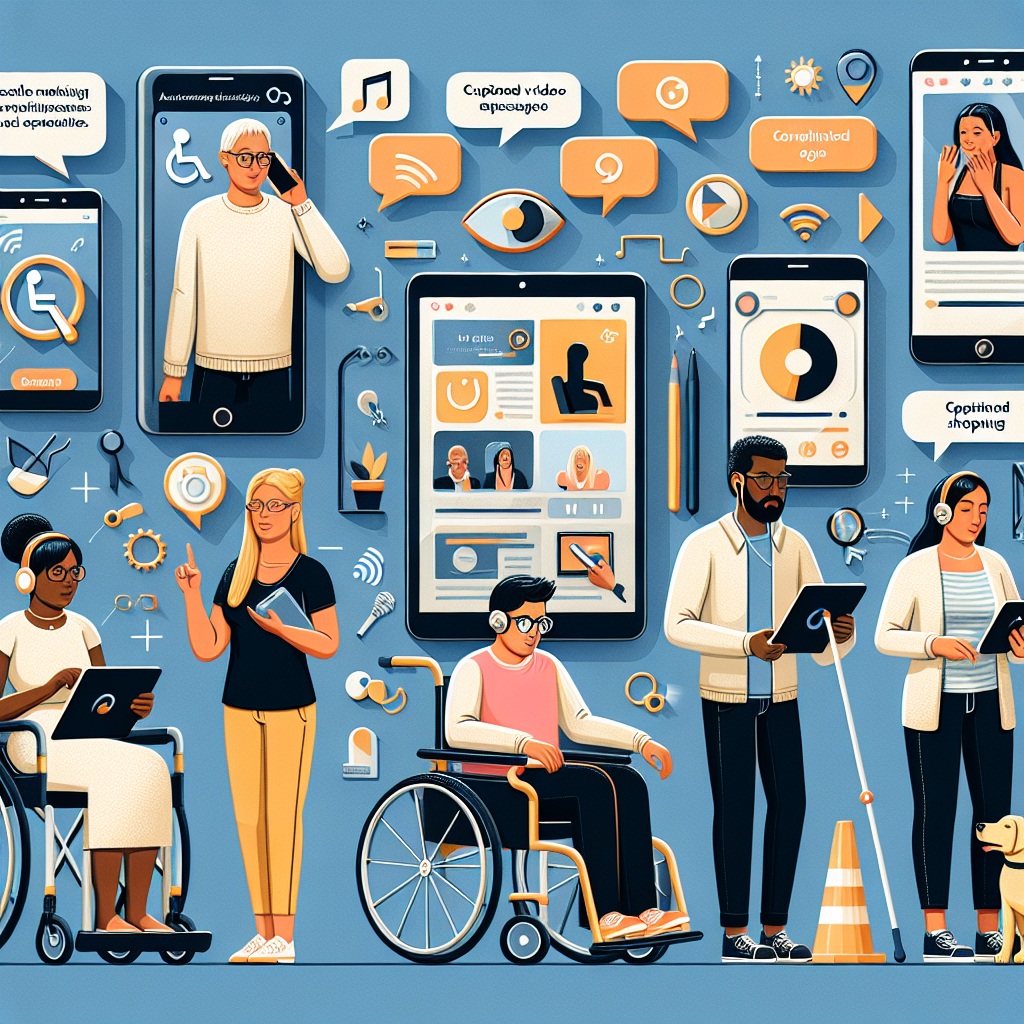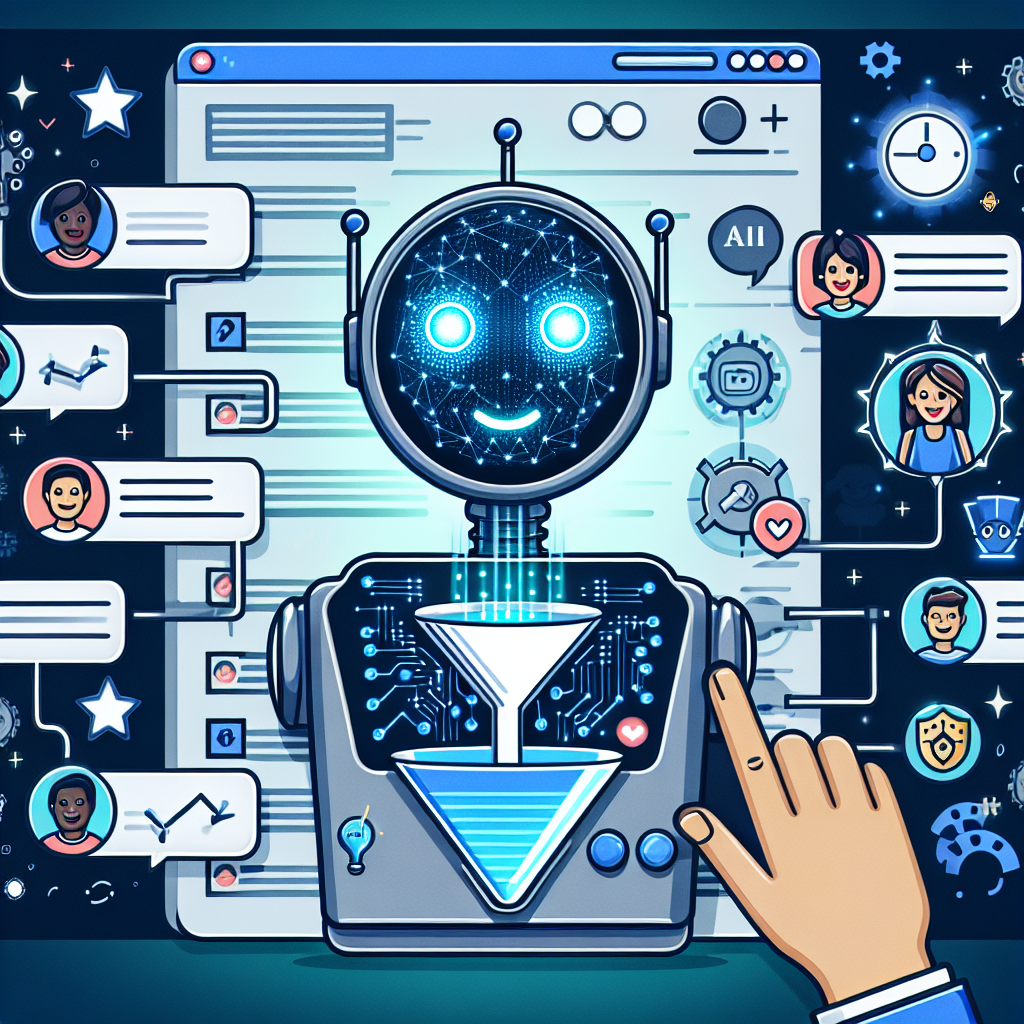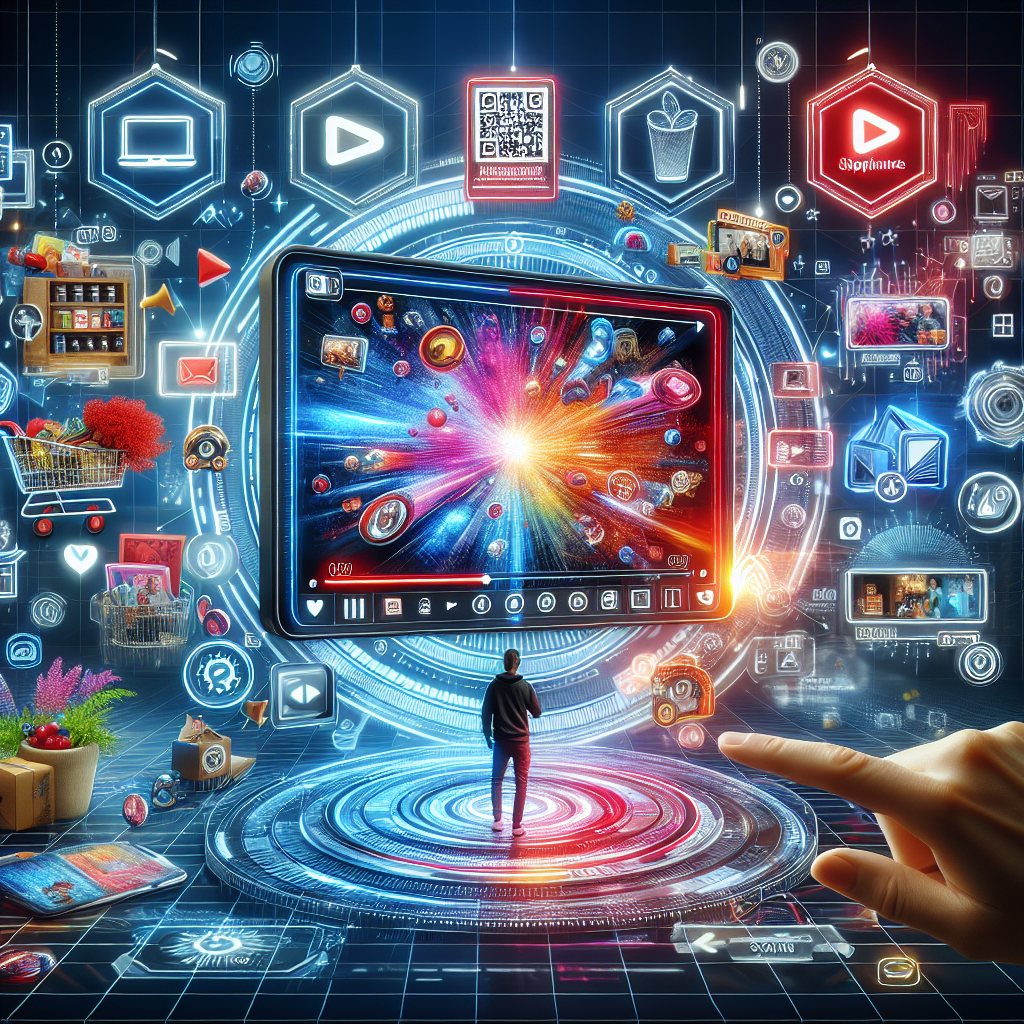H2: Unleashing the Power of ChatGPT: 10 AI-Powered Prompts to Revolutionize Digital Marketing
Are you a digital marketer looking for innovative ways to boost your productivity and creativity? Look no further! In this article, we will explore the power of AI and how it can revolutionize your marketing strategies. Specifically, we will delve into the world of ChatGPT, an artificial intelligence model developed by OpenAI, and discover 10 exciting prompts that can help digital marketers unleash their full potential.
As technology continues to advance at a rapid pace, AI has become an indispensable tool for businesses across various industries. In the realm of digital marketing, AI-powered solutions have proven to be game-changers, enabling marketers to streamline their processes, generate valuable insights, and create compelling content. ChatGPT, in particular, has garnered significant attention for its ability to understand and respond to human language, making it an ideal tool for brainstorming, content generation, and problem-solving.
Key Takeaway 1: ChatGPT can enhance productivity in digital marketing
ChatGPT, an AI-powered language model, can be a valuable tool for digital marketers. It can help streamline tasks such as content creation, social media management, and customer support, allowing marketers to accomplish more in less time.
Key Takeaway 2: Generate creative ideas with ChatGPT
By using ChatGPT prompts, digital marketers can tap into its creative capabilities to generate fresh ideas for marketing campaigns, blog posts, ad copy, and more. ChatGPT can provide unique perspectives and suggestions, sparking creativity and innovation.
Key Takeaway 3: Improve customer engagement and personalization
ChatGPT can assist marketers in creating personalized and engaging content for their target audience. By leveraging its natural language processing capabilities, marketers can craft compelling messages, tailored recommendations, and interactive experiences that resonate with customers.
Key Takeaway 4: Enhance data analysis and decision-making
With ChatGPT, digital marketers can analyze large datasets more efficiently. By inputting data-related prompts, marketers can gain insights, identify trends, and make data-driven decisions faster. ChatGPT can assist in market research, competitor analysis, and identifying customer preferences.
Key Takeaway 5: Use ChatGPT responsibly and with human oversight
While ChatGPT offers numerous benefits, it is crucial to use it responsibly and with human oversight. AI-generated content should be reviewed and edited by humans to ensure accuracy, avoid biases, and maintain brand voice. Human judgment is necessary to ensure ethical use and prevent potential issues.
Insight 1: AI-powered chatbots revolutionize customer engagement
One of the most significant impacts of ChatGPT on the digital marketing industry is its ability to revolutionize customer engagement through AI-powered chatbots. Traditionally, businesses have relied on human agents to handle customer inquiries and provide support. However, this approach can be time-consuming and costly, especially for companies with a large customer base.
With ChatGPT, digital marketers can now leverage AI technology to create chatbots that can handle customer interactions efficiently and effectively. These chatbots can be programmed to answer frequently asked questions, provide product recommendations, and even assist with the purchasing process. By automating these tasks, businesses can free up their human agents to focus on more complex customer issues, resulting in improved productivity and reduced costs.
Furthermore, AI-powered chatbots can provide personalized and tailored experiences for customers. By analyzing user data and preferences, ChatGPT can generate responses that are specific to each individual, creating a more engaging and satisfying customer journey. This level of personalization not only enhances the customer experience but also helps businesses build stronger relationships with their customers, leading to increased loyalty and higher conversion rates.
Insight 2: AI-driven content generation boosts creativity and efficiency
Content creation is a crucial aspect of digital marketing, but it can be time-consuming and challenging to consistently produce high-quality content. This is where ChatGPT comes in, offering digital marketers a powerful tool to boost creativity and efficiency in content generation.
By providing AI-generated prompts, ChatGPT can help marketers overcome writer’s block and spark new ideas for blog posts, social media updates, and other forms of content. Marketers can simply input a topic or keyword, and ChatGPT will generate relevant and engaging prompts to inspire their writing. This not only saves time but also helps marketers explore different angles and perspectives, leading to more diverse and compelling content.
Moreover, ChatGPT can assist in the actual writing process by generating draft content based on the provided prompts. Marketers can then refine and edit the AI-generated content to align with their brand voice and style. This collaborative approach between AI and human creativity not only accelerates content creation but also enhances the overall quality of the final output.
AI-driven content generation also enables marketers to scale their content production efforts. With ChatGPT’s assistance, marketers can produce a higher volume of content without compromising on quality. This is particularly valuable for businesses operating in fast-paced industries or those with a global presence, where maintaining a consistent and frequent content output is essential for staying relevant and engaging with their target audience.
Insight 3: Data-driven decision making with AI-powered insights
Data plays a critical role in digital marketing, helping businesses understand their audience, measure campaign performance, and make informed decisions. ChatGPT can contribute to this process by providing AI-powered insights that leverage data analytics and machine learning.
By analyzing large datasets, ChatGPT can identify patterns, trends, and correlations that may not be immediately apparent to human marketers. This can help businesses gain valuable insights into customer behavior, preferences, and purchasing patterns. For example, ChatGPT can analyze customer interactions with chatbots to identify common pain points or areas where the customer experience can be improved.
Furthermore, AI-powered insights can assist marketers in optimizing their marketing campaigns. ChatGPT can analyze campaign data and provide recommendations on targeting, messaging, and channel selection. This data-driven approach helps marketers make data-backed decisions, increasing the effectiveness and efficiency of their campaigns.
Additionally, ChatGPT can assist in predictive analytics, enabling marketers to anticipate customer needs and preferences. By leveraging historical data and machine learning algorithms, ChatGPT can generate predictions on customer behavior, allowing marketers to proactively tailor their strategies and offerings to meet customer expectations.
1. Understanding ChatGPT and its Potential for Digital Marketers
ChatGPT is an advanced language model developed by OpenAI that uses artificial intelligence to generate human-like text responses. It has been trained on a vast amount of data from the internet, making it a powerful tool for digital marketers looking to boost productivity and creativity. With its ability to understand and generate natural language, ChatGPT can assist marketers in various tasks, including content creation, market research, customer support, and more.
2. Generating Engaging Social Media Content with ChatGPT
Social media plays a crucial role in digital marketing, and creating engaging content is key to capturing the attention of your target audience. ChatGPT can be a valuable resource in generating fresh ideas for social media posts. By providing it with a brief description of your brand, target audience, and desired message, ChatGPT can offer creative suggestions for catchy headlines, engaging captions, and even relevant hashtags. This can save marketers valuable time and help them stay ahead of the competition.
3. Conducting Market Research and Competitor Analysis
Market research and competitor analysis are essential for any digital marketing strategy. ChatGPT can assist marketers in this process by providing insights and analysis based on the data it has been trained on. By asking ChatGPT specific questions about your industry, target market, or competitors, you can gain valuable information that can inform your marketing decisions. For example, you can ask ChatGPT about emerging trends, customer preferences, or strategies adopted by your competitors.
4. Enhancing Customer Support with AI-powered Chatbots
Customer support is a crucial aspect of digital marketing, and AI-powered chatbots can significantly improve the customer experience. ChatGPT can be used to train chatbots to provide accurate and helpful responses to customer inquiries. By feeding it with a dataset of customer queries and corresponding responses, ChatGPT can learn to understand and generate appropriate replies. This can help digital marketers provide prompt and personalized customer support, leading to increased customer satisfaction and loyalty.
5. Optimizing SEO with ChatGPT-generated Content
Search engine optimization (SEO) is vital for improving the visibility of your website in search engine results. ChatGPT can assist digital marketers in generating SEO-friendly content by suggesting relevant keywords, meta tags, and even full blog post ideas. By asking ChatGPT for content recommendations based on specific topics or target keywords, marketers can create high-quality content that resonates with both search engines and their target audience.
6. Personalizing Email Marketing Campaigns with ChatGPT
Email marketing remains an effective strategy for reaching and engaging with customers. ChatGPT can help digital marketers personalize their email campaigns by generating compelling subject lines, engaging email copy, and even product recommendations based on customer data. By leveraging the natural language capabilities of ChatGPT, marketers can create emails that feel more personal and relevant, leading to higher open and click-through rates.
7. Aiding in Content Curation and Idea Generation
Content curation is an important part of digital marketing, as it allows marketers to share valuable information with their audience while establishing themselves as industry experts. ChatGPT can assist in content curation by suggesting relevant articles, blog posts, or research papers based on specific topics or keywords. Additionally, it can help generate new content ideas by providing fresh perspectives or unique angles on popular industry topics.
8. Improving Ad Copy and Landing Page Conversion Rates
Creating compelling ad copy and landing pages is crucial for driving conversions in digital marketing campaigns. ChatGPT can provide valuable input in optimizing ad copy by suggesting powerful headlines, persuasive calls-to-action, and engaging ad descriptions. Similarly, it can help improve landing page conversion rates by generating persuasive copy that highlights the benefits of a product or service. By leveraging the language generation capabilities of ChatGPT, marketers can create more effective and persuasive marketing materials.
9. Assisting in Data Analysis and Insights Generation
Data analysis plays a significant role in digital marketing, as it helps marketers understand the effectiveness of their strategies and make data-driven decisions. ChatGPT can aid in data analysis by providing insights and recommendations based on the data you provide. For example, you can ask ChatGPT to analyze website analytics data and suggest potential areas for improvement or identify patterns in customer behavior that can inform your marketing strategies.
10. Overcoming Challenges and Ethical Considerations
While ChatGPT offers numerous benefits to digital marketers, there are also challenges and ethical considerations to be aware of. One challenge is ensuring the accuracy and reliability of the generated content. Marketers should carefully review and edit the output of ChatGPT to avoid any misinformation or misleading statements. Additionally, it is important to consider the ethical implications of using AI in marketing, such as privacy concerns and potential biases in the training data. Digital marketers should approach ChatGPT as a tool to enhance their work rather than a replacement for human creativity and critical thinking.
1. Understanding ChatGPT
ChatGPT is an advanced language model developed by OpenAI that uses deep learning techniques to generate human-like text responses. It is based on the GPT (Generative Pre-trained Transformer) architecture, which has been trained on a massive amount of data from the internet. The model is capable of understanding and generating text in a conversational manner, making it suitable for various applications, including digital marketing.
2. Natural Language Processing (NLP)
ChatGPT utilizes Natural Language Processing (NLP) techniques to understand and respond to user inputs. NLP involves the analysis and interpretation of human language, enabling the model to comprehend the context and intent behind user queries. This allows marketers to interact with ChatGPT using natural language commands, making it more intuitive and user-friendly.
3. Generating Creative Content Ideas
One of the key benefits of using ChatGPT for digital marketers is its ability to generate creative content ideas. By providing the model with a brief or a specific topic, marketers can receive a variety of unique and innovative suggestions for their marketing campaigns. This can be particularly useful when brainstorming new ideas or when facing creative blocks.
4. Improving Copywriting and Advertisements
ChatGPT can also assist digital marketers in improving their copywriting and advertisements. Marketers can ask the model to review their existing content and provide suggestions for enhancements. This could include refining the tone, making the message more compelling, or optimizing the content for specific target audiences. By leveraging ChatGPT’s language generation capabilities, marketers can refine their marketing materials and potentially improve their conversion rates.
5. Personalizing User Interactions
Personalization is a key aspect of successful marketing campaigns. ChatGPT can help marketers create personalized user interactions by generating tailored responses based on user preferences or characteristics. By analyzing user inputs and context, the model can provide relevant and customized recommendations or responses. This can enhance user engagement and improve the overall user experience.
6. Automating Customer Support
ChatGPT can be utilized to automate customer support processes, reducing the burden on human support teams. By training the model on a dataset of frequently asked questions and appropriate responses, marketers can deploy it as a chatbot to handle customer queries. This can help streamline customer support operations, provide quick and accurate responses, and improve customer satisfaction.
7. Enhancing Market Research
Market research plays a crucial role in understanding customer needs and preferences. ChatGPT can assist digital marketers in this area by generating insights and recommendations based on market data. Marketers can ask the model to analyze market trends, customer feedback, or competitor strategies, and provide valuable insights to inform their decision-making process.
8. Generating Social Media Content
Social media platforms are integral to digital marketing strategies. ChatGPT can generate engaging and shareable content ideas for social media campaigns. Marketers can ask the model to provide suggestions for catchy captions, engaging posts, or even responses to user comments. This can help marketers maintain an active presence on social media and drive user engagement.
9. Assisting with SEO Optimization
Search Engine Optimization (SEO) is crucial for improving website visibility and driving organic traffic. ChatGPT can assist digital marketers in optimizing their content for search engines. Marketers can ask the model to provide recommendations for keyword usage, meta tags, or even generate entire paragraphs of SEO-optimized content. By leveraging ChatGPT’s language generation capabilities, marketers can enhance their SEO strategies and improve their search engine rankings.
10. Ensuring Ethical and Responsible Use
While ChatGPT offers numerous advantages to digital marketers, it is important to ensure its ethical and responsible use. Marketers should be cautious about the potential biases or inappropriate content that the model may generate. OpenAI provides guidelines and best practices for responsible AI use, and marketers should adhere to these guidelines to avoid any unintended consequences or ethical issues.
FAQs
1. What is ChatGPT?
ChatGPT is an AI language model developed by OpenAI. It is designed to generate human-like text responses based on the prompts provided to it. It can be used for a wide range of applications, including generating creative ideas, answering questions, and assisting with content creation.
2. How can ChatGPT help digital marketers?
ChatGPT can be a valuable tool for digital marketers as it can help boost productivity and creativity. It can generate content ideas, provide insights on target audience preferences, assist with copywriting, and even help with social media engagement strategies.
3. Are there any limitations to using ChatGPT?
While ChatGPT is a powerful tool, it does have some limitations. It may not always generate accurate or reliable information, and its responses can sometimes be biased or lack context. It is important to use the generated content as a starting point and verify the information before using it in marketing campaigns.
4. How do I use ChatGPT for generating content ideas?
To use ChatGPT for generating content ideas, you can provide it with a brief description of your target audience and the topic you want ideas for. For example, you can ask “What are some creative content ideas for engaging millennials in the fitness industry?” ChatGPT will then generate a list of potential content ideas that you can further refine and develop.
5. Can ChatGPT help with copywriting?
Yes, ChatGPT can assist with copywriting by providing suggestions and improvements to your existing content. You can provide it with a draft of your copy and ask for specific suggestions like “How can I make this product description more compelling?” ChatGPT will then generate alternative versions or provide specific recommendations to enhance your copy.
6. Is ChatGPT suitable for social media engagement?
ChatGPT can be a useful tool for social media engagement strategies. It can help generate catchy headlines, engaging captions, or even suggest creative ways to interact with your audience. However, it is important to ensure that the generated content aligns with your brand voice and values.
7. Can ChatGPT replace human creativity in marketing?
No, ChatGPT cannot replace human creativity in marketing. While it can generate ideas and suggestions, the final creative decisions should always be made by humans. ChatGPT can be seen as a tool to assist and inspire marketers, but it cannot replicate the unique insights and intuition that humans bring to the creative process.
8. How can I ensure the content generated by ChatGPT is accurate?
To ensure the accuracy of the content generated by ChatGPT, it is important to fact-check and verify the information. Use reliable sources and cross-reference the generated content with other trusted sources. It is also helpful to have subject matter experts review the content to ensure its accuracy.
9. Are there any ethical considerations when using ChatGPT in marketing?
Yes, there are ethical considerations when using ChatGPT in marketing. It is important to be transparent with your audience about the use of AI-generated content. Clearly indicate when content has been generated with the help of AI and ensure that it aligns with your brand values and guidelines.
10. How can I get started with using ChatGPT for digital marketing?
To get started with using ChatGPT for digital marketing, you can sign up for an account on the OpenAI platform. Familiarize yourself with the guidelines and best practices provided by OpenAI to ensure responsible and effective use of the tool. Experiment with different prompts and approaches to find the most valuable applications for your marketing needs.
Common Misconception 1: AI will replace human creativity in digital marketing
One common misconception about using AI, specifically ChatGPT, in digital marketing is that it will replace human creativity. Some people fear that relying on AI for content creation and strategy development will result in generic and soulless campaigns.
However, it is important to understand that AI is a tool that can enhance human creativity rather than replace it. ChatGPT can generate ideas, provide insights, and even help with content creation, but it cannot replicate the depth of human emotions, experiences, and perspectives.
AI can analyze vast amounts of data, identify patterns, and make predictions, which can be invaluable for digital marketers. By leveraging AI, marketers can gain valuable insights into consumer behavior, preferences, and trends. This information can then be used to inform and inspire human creativity, enabling marketers to develop more effective and personalized campaigns.
Ultimately, the role of AI in digital marketing is to augment human creativity, allowing marketers to work more efficiently and effectively. It is not a substitute for human creativity, but rather a powerful tool that can enhance it.
Common Misconception 2: AI cannot understand the nuances of human language
Another misconception about AI, including ChatGPT, is that it cannot truly understand the nuances of human language. Some believe that AI can only generate generic and contextually inaccurate responses, leading to miscommunication and ineffective communication strategies.
While it is true that AI does not possess human-like understanding of language, recent advancements in natural language processing have significantly improved AI’s ability to comprehend and generate contextually appropriate responses.
ChatGPT, for example, has been trained on a vast amount of text data from the internet, allowing it to learn patterns, grammatical structures, and even some level of context. By fine-tuning the model and providing it with specific instructions and examples, marketers can guide ChatGPT to generate more accurate and contextually relevant content.
However, it is important to note that AI is not infallible. It can still produce errors or generate responses that may not align perfectly with human expectations. Human oversight and editing are crucial to ensure the accuracy and quality of AI-generated content.
When used appropriately and with human supervision, AI can understand and generate language that is effective in digital marketing. It can assist in tasks such as drafting social media posts, writing blog articles, or even developing personalized email campaigns.
Common Misconception 3: AI will replace the need for human digital marketers
One of the most prevalent misconceptions surrounding AI in digital marketing is the fear that it will replace the need for human digital marketers altogether. Some believe that AI can automate all aspects of marketing, rendering human expertise obsolete.
While AI can automate certain repetitive and time-consuming tasks, it cannot replace the strategic thinking, emotional intelligence, and human judgment that digital marketers bring to the table.
Digital marketing involves understanding target audiences, developing creative campaigns, interpreting data, and making informed decisions. These tasks require human skills and expertise that AI cannot replicate.
AI can certainly streamline processes and provide valuable insights, but it cannot replace the need for human marketers who can interpret and act upon those insights. AI is a tool that complements human expertise, allowing marketers to focus on higher-level strategic thinking and creativity.
Furthermore, AI requires human oversight and guidance to ensure ethical and responsible use. Algorithms can inadvertently perpetuate biases or generate inappropriate content, which underscores the importance of human involvement in the digital marketing process.
1. Start with a clear objective
Before using ChatGPT prompts for digital marketing purposes, it’s essential to have a clear objective in mind. Define what you want to achieve, whether it’s generating new ideas, improving productivity, or enhancing creativity. This will help you focus your efforts and make the most out of the AI-powered tool.
2. Experiment with different prompts
Don’t limit yourself to a single prompt. ChatGPT offers a variety of prompts specifically designed for digital marketers. Experiment with different prompts to explore various angles and perspectives. This will help you uncover fresh ideas and unique solutions to your marketing challenges.
3. Use prompts for brainstorming sessions
When you’re stuck in a creative rut, ChatGPT can be a valuable resource. Utilize the prompts to facilitate brainstorming sessions with your team. The AI-generated suggestions can spark new ideas and ignite productive discussions. Collaboratively exploring the prompts can lead to innovative marketing strategies.
4. Tailor prompts to your specific needs
While the provided prompts are a great starting point, don’t hesitate to customize them to suit your specific needs. Modify the questions or statements to align with your industry, target audience, or marketing goals. This personalization will make the prompts more relevant and valuable for your marketing endeavors.
5. Combine prompts for comprehensive insights
To gain a comprehensive understanding of a particular marketing challenge, consider combining multiple prompts. By doing so, you can explore different aspects, perspectives, and potential solutions. This holistic approach will provide you with a well-rounded view and enable you to make informed decisions.
6. Keep an open mind
When using ChatGPT prompts, it’s important to keep an open mind and embrace the AI-generated suggestions. Sometimes, the tool might offer unconventional or unexpected ideas. Instead of dismissing them outright, consider their potential value and how they could be adapted to your marketing strategy.
7. Validate AI-generated ideas
While ChatGPT can provide valuable insights, it’s crucial to validate the AI-generated ideas before implementing them. Use your knowledge, experience, and market research to assess the feasibility and potential impact of the suggestions. This will ensure that you make informed decisions and avoid any unintended consequences.
8. Iterate and refine
Don’t expect instant perfection from the AI-generated prompts. Treat them as a starting point and iterate on the ideas they inspire. Refine and polish the concepts to align with your brand, audience, and marketing objectives. Continuous improvement and refinement will help you leverage the full potential of the AI-powered tool.
9. Use prompts as a learning resource
ChatGPT prompts can be an excellent resource for learning and expanding your knowledge in the field of digital marketing. Analyze the AI-generated suggestions, identify patterns, and gain insights into emerging trends or innovative techniques. This continuous learning process will enhance your expertise and keep you ahead of the curve.
10. Share and collaborate
Lastly, don’t keep the benefits of ChatGPT prompts to yourself. Share the generated ideas and insights with your team, colleagues, or industry peers. Collaborate on refining and implementing the suggestions. By fostering a culture of knowledge sharing and collaboration, you can collectively leverage the power of AI to drive marketing success.
Concept 1: Natural Language Processing (NLP)
Natural Language Processing (NLP) is a branch of artificial intelligence that focuses on the interaction between computers and human language. In simpler terms, it is about teaching computers to understand and interpret human language.
With NLP, digital marketers can use AI-powered tools to analyze and understand customer feedback, social media mentions, and online reviews. This helps them gain insights into customer preferences, sentiment, and trends, which can be used to improve marketing strategies and campaigns.
Concept 2: Content Generation
Content generation refers to the process of creating written, visual, or audio content for marketing purposes. AI-powered tools like ChatGPT can assist digital marketers in generating content more efficiently.
By using ChatGPT prompts, marketers can provide a brief description or outline of the content they need, and the AI model will generate a complete piece of content based on that input. This can save time and effort in brainstorming ideas and writing content from scratch.
However, it’s important to note that while AI can assist in content generation, human creativity and editing are still crucial to ensure the quality and relevance of the content.
Concept 3: Personalized Marketing
Personalized marketing is an approach that tailors marketing messages and experiences to individual customers based on their preferences, behaviors, and demographics. AI can play a significant role in enabling personalized marketing at scale.
With AI-powered tools like ChatGPT, digital marketers can analyze vast amounts of customer data to identify patterns and insights. This information can then be used to create personalized marketing campaigns that resonate with individual customers.
For example, AI can help marketers create personalized email campaigns by generating dynamic content based on customer segmentation and preferences. This can lead to higher engagement and conversion rates, as customers are more likely to respond positively to messages that are relevant to their needs and interests.
In conclusion, the use of ChatGPT prompts can greatly benefit digital marketers in boosting their productivity and creativity with the help of AI. The ten prompts discussed in this article provide a range of ideas and strategies that marketers can leverage to improve their marketing efforts.
From generating engaging social media posts to brainstorming content ideas and optimizing ad campaigns, ChatGPT prompts offer a valuable resource for digital marketers looking to streamline their processes and enhance their results. By harnessing the power of AI, marketers can save time, generate fresh ideas, and stay ahead of the competition.




